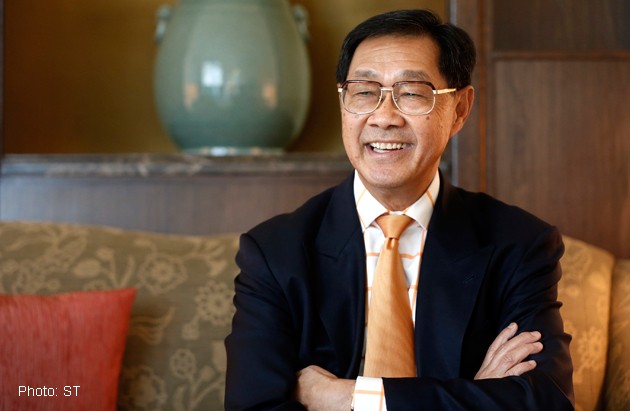Ambitious plans, but new Thai economic czar unfazed

Post-Coup Thailand has ambitious fiscal and economic policies in the pipeline, all of which need to be completed in one year.
The government wants to cut energy subsidies, levy property and inheritance taxes, integrate the digital economy and push Thai ventures abroad.
It is also aiming to raise the proportion of the national budget spent on investment, says Mr Pridiyathorn Devakula, the deputy prime minister overseeing economic policy.
Few in the military-dominated Cabinet sound as confident as he.
"I am 100 per cent confident, more confident than the other people in the government," he told The Straits Times in an interview while on a trip to Singapore.
"There is nothing difficult, because what we are doing is for the interests of the nation. You simply have to explain to the people."
Last night, he told the participants at the Forbes Global CEO Conference at the Shangri-La Hotel that he was doing away with "four or five categories of tax" to entice companies to base themselves in Thailand.
"We have to match Singapore," he said.
While coup-maker and Prime Minister Prayuth Chan-ocha has hinted that it may take longer than expected for elections to take place, Mr Pridiyathorn told the conference that the government should "stick to the existing timetable and do everything as fast as possible".
"You cannot hold the election too long (from now) anyway. Right now, you still remember those six long months (of protests).
But who knows, three, four months from now, people may start to be fed up with some slow performance of this government."
The current government, he told The Straits Times, had one year to "lay a good foundation so that anyone, any government coming in will have no choice but to expand it, to follow it". This would involve convincing the public about the soundness of its policies.
Mr Pridiyathorn has to turn around an economy battered by seven months of political turbulence prior to the coup in May, as analysts worry that rising costs mean that "Teflon Thailand" is no longer so impervious to such political pressures.
The Asian Development Bank has forecast growth of just 1.5 per cent this year and 4.5 per cent next year.
On Oct 1, the Cabinet approved stimulus measures worth 364.5 billion baht (S$14 billion) that involve 40 billion baht one-off payments to farmers, as well as for repairs of schools, hospitals and irrigation systems.
In a Cabinet stacked with generals and backed by an equally military dominated legislature, Mr Pridiyathorn stands out as the most prominent civilian in the government.
The tall, 67-year-old aristocrat and former Bank of Thailand governor has a Master of Business Administration degree from the elite Wharton School at the University of Pennsylvania.
His great-grandfather is King Mongkut, who ruled then Siam in the 19th century and is better known to outsiders as the monarch portrayed in the 1956 film The King And I.
In coup-prone Thailand, Mr Pridiyathorn has consistently been the man called upon to deliver the economic goods after each putsch.
Between 1991 and 1992, he held the post of deputy minister of commerce under the two unelected governments led by Mr Anand Panyarachun and General Suchinda Kraprayoon.
After the military toppled then Prime Minister Thaksin Shinawatra in 2006, Mr Pridiyathorn was similarly picked as minister for finance.
It was under his watch that the government imposed capital controls in December that year to halt a surge in the baht's value, only to roll some of it back the next day after the stock market plunged 15 per cent.
He insisted back then that it was "not a mistake". He quit, though, after four months.
Reflecting on all his experiences, he said yesterday: "If you are not too concerned about the chair you are sitting on, or the position, you can always make the right decision."
Still, he says, his current role is the most challenging so far because of the time constraint.
Asked how he could gauge public sentiment now, given that the martial law has created a climate of fear, he said: "They don't dare to speak out against the military. But these people dare to speak out against me."
"The civilian minister," he said "would have more tolerance to listen to them and there would be two-way communication."

This article was first published on October 30, 2014.
Get a copy of The Straits Times or go to straitstimes.com for more stories.